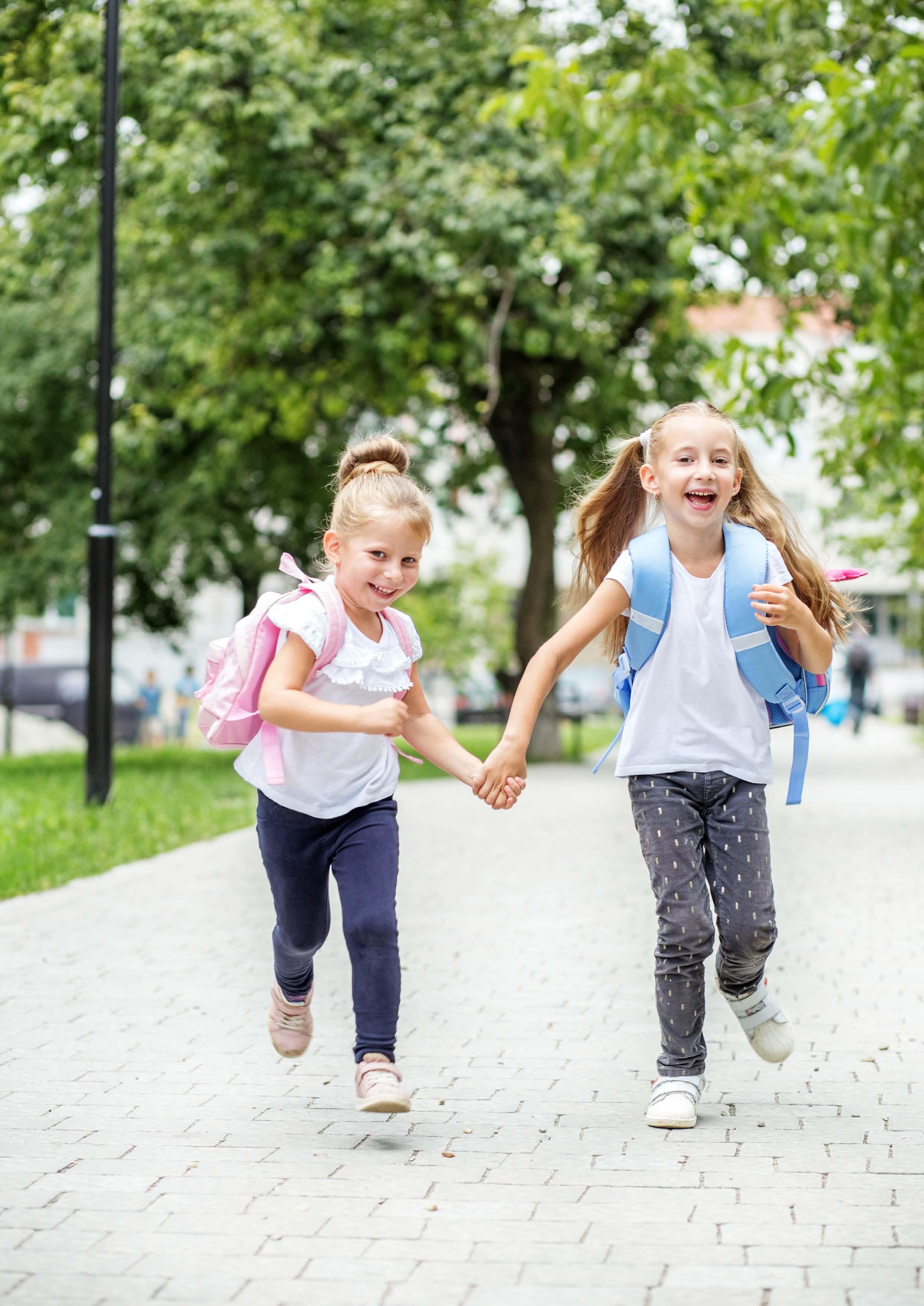HEADSPACE
MENTAL HEALTH & WELLBEING IN SCHOOLS
THE MIND BULLY: EQUIPPING STUDENTS WITH THE SKILLS THEY NEED TO UNDERSTAND AND ACCEPT THEIR MIND
RCOT publishes OT Life Hacks to support children’s mental health and wellbeing


THE MIND BULLY: EQUIPPING STUDENTS WITH THE SKILLS THEY NEED TO UNDERSTAND AND ACCEPT THEIR MIND
RCOT publishes OT Life Hacks to support children’s mental health and wellbeing


Helping schools combat mental health issues, Head Space Magazine offers insights and helpful advice on how teachers can tackle mental health and anxiety within the education sector.
4. THE MIND BULLY: EQUIPPING STUDENTS WITH THE SKILLS THEY NEED TO UNDERSTAND AND ACCEPT THEIR MIND
5. SURVEY REVEALS A THIRD OF YOUNG CHILDREN HAVE BEEN HARASSED ON ROBLOX
6. NON-FORMAL EDUCATION TACKLES CHILDREN’S MENTAL HEALTH CRISIS BY PROVIDING COMMUNITY AND ENCOURAGEMENT
7. THE DISINTEGRATION OF THE SOCIAL SELF IN YOUNGER GENERATIONS
8. TALK TO SAL: EMPOWERING DIGITAL YOUTH SUPPORT FOR A BRIGHTER FUTURE
10. RCOT PUBLISHES OT LIFE HACKS TO SUPPORT CHILDREN’S MENTAL HEALTH AND WELLBEING

13. CHILDREN’S HAPPINESS PLUMMETS WHEN THEY LEAVE PRIMARY SCHOOLS: FIVE RED FLAGS TO LOOK OUT FOR
14. YOUNG PEOPLE BLAME OLDER GENERATIONS FOR THEIR FUTURE AS 40% OF 13-18 YEAROLDS ADMIT THEY ARE SCARED FOR WHAT’S AHEAD
Asurvey completed published by Place2Be and the National Association of Head Teachers in February 2022 found that mental health problems amongst pupils had significantly increased since the start of the academic year, with higher incidences of low selfesteem, depression and constant feelings of anger.
There is clearly an urgent need to establish a culture of positive mental health in schools and set students up with the skills they need to cultivate emotional resilience, self-esteem and a secure sense of personal identity. Good quality, evidencebased early intervention strategies are key to prevent the further rise of mental health needs in children and adolescents.

The Rooms of Knutsford and ACTivate Workshops have partnered to develop a uniquely interactive workshop, informed by evidence-based practice, helping children better understand and manage feelings of anxiety. The workshop is facilitated by a Senior Cognitive Behavioural Therapist and an experienced facilitator from ACTivate Workshops, combining therapeutic principles with imaginative, engaging and interactive group-based activities. This workshop
uniquely blends CBT theory with creative, interactive role-playing. The objective here is for students to learn specific strategies and skills to develop an understanding of their own mental health, whilst enjoying collaborating with their peers and classmates in an exciting, immersive experience.
The creative frame-work for the workshop involves students acquiring specific skills relating to anxiety management to go in their ‘toolkit’, whilst navigating through a “training zone” with various “levels”. Each imaginary door inside the training zone opens to reveal a specific real-life scenario that might be commonly experienced by children and young people. The two facilitators (representing both The Rooms and ACTivate Workshops) adopt the roles of the “Professor” and the “Tour Guide”, guiding participants through each stage of the journey. The workshop culminates in a group reflection and students are guided through the implementation of a specific, personalised plan to put their newly learned skills into practice in future scenarios.
According to the clinical guidelines set out by the National Institute for Clinical Excellence (NICE), Cognitive Behavioural Therapy (CBT) has some of the strongest evidence in terms of outcomes when

supporting young people with anxiety and depression. Key principles include fostering a sense of acceptance for some of the ways we feel and balancing this with the use of skills to change the way emotions affect us. From a therapeutic perspective, translating the theoretical principles into interactive, memorable and engaging activities is key when developing a strong effective therapeutic relationship with children. Whilst the workshop should not be considered “group-therapy”, it has been created in line with the process of delivering therapy on an individual basis with young people. Fundamental elements such as rapport building, psychoeducation, thought-based and behavioural skill development are at the heart of sessions delivered. All materials are provided, including post-workshop resources for teachers and each participant receives a personal certificate to mark their journey through the workshop.
Contact:
www.activateworkshops.co.uk enquiries@ activateworkshops.co.uk +447506 680 705
www.theroomsofknutsford.co.uk enquiries@theroomsofknutsford.co.uk +447751 217 845
In May 2022, a report was published detailing that a “record number of more than 400,000 children a month” were being treated for mental health problems (Mental Health Services Monthly – NHS).Images courtesy of Activate Workshops
Roblox and YouTube are the worst sites for child harassment, according to a new survey from ExpressVPN.
The consumer privacy and security company found that over a third of children in the UK have experienced harassment on Roblox (34%) and YouTube (34%), while 25% have experienced harassment on TikTok and 15% on Facebook.
With children’s internet usage at an all-time high, ExpressVPN’s study polled 2,000 children aged 4 to 13 in the US and UK who have access to the internet, as well as their parents or guardians (over 2,000 adults), to understand the extent of risk when using online services.
The research found that the majority of UK parents are concerned about their children’s online safety—with 62% of adult respondents citing fears about cyberbullying. This was followed by concerns about online predators (61%) and inappropriate content (39%).

Despite 92% of parents admitting that they monitor their children’s activity online regularly, when asked about what they actually experience on the internet, 30% of UK child respondents said they encountered someone being rude or swearing online, while 27% reported seeing scary videos and 21% scary images.
Confirming parents’ fears,17% of children
admitted to being bullied online. Belfast was revealed to be the city with the biggest online bullying problem, with 37% of children from the region saying they’d been bullied online. Manchester and Brighton came in second place (24%), and Edinburgh third (22%).
More worryingly, 13% of British children surveyed have had a stranger ask which school they go to, and 9% have been asked for their home address.
The survey also found that while only about a quarter of parents surveyed say that they allow their 4- to 13-year-olds to have a social media account, over half of their children admitted to using social media.
“It’s undeniably alarming how many children are experiencing bullying, inappropriate content, and harassment online. Parents often do everything they can to protect their children from this experience. Still, it’s not as simple as putting parental controls on their devices and banning technology altogether isn’t a reasonable option,” commented Lauren Hendry Parsons, Privacy Advocate, ExpressVPN.
“Children today are digital natives. They are growing up around technology and using it well is a critical tool for life and learning in today’s society. As a result, kids can be more tech-savvy than their parents, evading parental controls on their devices
or finding other ways to access digital services their friends are also using.
“For parents in 2023, the number one tool in your protection arsenal is education together with a strong foundation of trust.
It’s education on how they can be a responsible digital citizen, why it’s important to be open and honest about what they see or experience online, and how they can use the internet safely.
“But this isn’t always an easy conversation to have, especially in teenage years, so recruit the power of a cool aunt or uncle to help have these conversations too. If your child can be empowered with ageappropriate knowledge about digital risks from multiple sources, they will become more comfortable with having open conversations about it and better equipped to deal with situations that arise,” said Hendry Parsons.
ExpressVPN is committed to helping parents protect their children online and offers free resources and tips to help parents keep their children safe on social media, including a free Udemy course on online privacy and security essentials.
For more information on the survey results or to access ExpressVPN’s online safety resources, please visit: https://www. expressvpn.com/blog/survey-children-onsocial-media/.
Self-confidence issues continued to be a rampant issue among children in 2022, leading parents and schools alike to search for new solutions. Non-formal education can help children to become more resilient and self-assured by providing a supportive environment to explore their interests and gain confidence in their abilities.
Self-esteem is a critical component of a child’s emotional and mental well-being, yet studies show that it is on the decline. For example, most children ages 11-14 in the UK experience a significant drop in their mental well-being during their first years at secondary school, regardless of their circumstances or background.

Research also indicates that children are facing increasing pressures from social media, academic performance, and peer interactions that can negatively impact their self-esteem. This is an alarming trend as how well-adjusted a child is socially, behaviorally, and emotionally will in part determine how they deal with obstacles, peer pressure, and other difficulties throughout life.
Akvilė Bartaševičiūtė — the founder of FRIENDOLAND, an intercontinental non-formal e-school with classes for children ages 6-17 — says that schools often lack the tools and resources necessary to keep in constant check with their pupils and their emotional state. “Children in the traditional schooling system are already facing the repercussions of insufficient attention paid toward the mental health of students,” she explained. “While this trend can be attributed to many factors — from standardized testing and social dynamics — and schools cannot be expected to cover all aspects of a pupil’s well-being with very limited resources, the lack of confidence-building tools in education is apparent.”
Tackling the children’s mental health crisis will require a joint effort from parents, educators, and legislators. However, short-term, there are online tools available to any family that could help boost a
child’s self-esteem and cultivate confidence.
For one, non-formal online schooling offers children the opportunity to challenge themselves and delve into unfamiliar subjects in a supportive, non-competitive environment. Research has proved there exists a link between poor academic results and issues with self-esteem, thus, a learning process that does not assign grades to the work of students may help them tackle challenges and take academic risks without fear of failure.
Confidence may also be built by a child’s healthy social development, and schools often have problems with mitigating bullying. Children are often unnaturally forced into age cohorts at school, not interest groups and there are insufficient role models to teach them how to deal with their fellow humans in a humane way. Conversely, non-formal classes are formed
purely on a joint interest in a given topic: from sustainability to cultural traditions. This makes it easier for children to bond and work together toward more knowledge.
“Non-formal education places a lot of emphasis on community, as it is entirely voluntary and born out of a mutual love for knowledge and all the curious things about the world. What we often see on these platforms are very close relations between the staff, parents, and students,” Bartaševičiūtė noted. “This close-knit environment encourages openness, which is extremely important for a child’s well being. For example, we even offer classes completely dedicated to emotional intelligence, where students can learn how to better identify their feelings and how to cope with them in a healthy way.”
Data from the Mental Health Million Project in 34 countries shows a unique constellation of mental health symptoms in young adults that point to the disintegration of the Social Self.
Sapien Labs’ Mental State of the World Report 2021 showed that mental wellbeing has been declining with each younger generation over the past decade. A new rapid report sheds light on the nature of mental health challenges that dominate this decline.
Key findings are:
Over the pandemic, the mental wellbeing of each younger age group of adults fell much more dramatically. Across 34 countries where data was acquired, the decline, particularly for young adults (ages 18-24), exacerbates a trend that existed prior to the pandemic, but began after 2010, alongside the growth of smartphone use. Prior to 2010, studies showed that young adults had the highest levels of psychological wellbeing, but since then, the trend has been in the opposite direction.
The study outlines the key symptoms that impact the majority of young adults 18-24 or are most significantly amplified or
deteriorated compared to older adults. These include Obsessive, strange or unwanted thoughts, Self-image, Self-worth and confidence, Feelings of being detached from reality, Relationships with others and Suicidal thoughts as well as the more commonly recognized symptoms of Fear and anxiety and Feelings of sadness, distress or hopelessness.

This constellation of symptoms that dominate the mental profile of young adults do not map to any single disorder as defined by the DSM (which is the standard classification system for mental disorders used by mental health professionals in the United States).
Altogether, these symptoms point to a decline of the Social Self, a composite metric of how we view ourselves and are able to form and maintain relationships –essentially a view of how an individual is integrated into the Social Fabric.
Tara Thiagarajan, Chief Scientist at Sapien Labs, says: “Altogether this highlights the
magnitude and nature of the challenges of social isolation and digital interaction at the expense of in-person social interaction. Data shows that people now spend 7-10 hours online. This leaves little time for in-person social engagement. Prior to the Internet, by the time someone turned 18, we estimate that they would likely have spent anywhere from 15,000 to 25,0000 hours interacting with peers and family in person.
“In the Internet age it is likely in the range of just 1,500 to 5,000 hours. Interacting in person teaches us to read facial expressions, body language, physical touch, calibrate our emotional responses appropriately to the situation, resolve conflicts and so on. All things that are crucial for our socioemotional development, the ability to form strong relationships and integrate into the fabric of society, without which people feel begin to feel detached from society and begin to harbor suicidal thoughts”.





In a rapidly evolving digital landscape, young people often face a multitude of challenges and uncertainties. Amidst this, having access to a safe and confidential platform for support and guidance becomes essential. Enter Talk to SAL (Support, Advocacy & Live Chat) a ground breaking digital youth support service that provides a secure space for individuals under 25 and their parents or carers to access resources, engage in live chat sessions with trainined SAL practitioners, and discuss a wide range of important topics.
Designed to Address
Pressing Concerns:





Talk to SAL recognizes the pressing concerns faced by young individuals today. From healthy relationships and consent to online safety, gender identity, sexuality, peer pressure, bullying, and exploitation, SAL offers a safe haven where young people can initiate and engage in discussions surrounding these difficult topics. By fostering an environment of trust, Talk to SAL empowers them to share their worries and seek guidance and support from trained practitioners.
Expanding Reach and Support:
Originally aimed at individuals under 16, Talk to SAL has experienced a surge in demand since its launch in February 2021. In response, the project has expanded its age range to include young people up to the
age of 25. This expansion ensures that Talk to SAL can adapt to the evolving needs of young adults as they navigate the transitional period from adolescence to adulthood. Furthermore, the platform hosts weekly parent, carer and professional sessions as well as regular open forums, providing comprehensive support for young individuals and their support networks.
Vital Prevention Work and Wellbeing Promotion:
Talk to SAL not only addresses immediate concerns but also enables Savana to carry out vital prevention work. By helping young people understand the importance of consent, fostering healthy relationships, and promoting reporting and seeking support when needed, Talk to SAL plays a pivotal role in prevention efforts. Moreover, the platform promotes positive mental health, empowering young individuals to build resilience and navigate life’s challenges with confidence. Talk to SAL also serves as a valuable resource for signposting children and young people to appropriate professional and specialist help, ensuring their holistic well-being.
The Power of Digital Support: Talk to SAL, has proven to be a vital resource for young people seeking support. Its digital nature ensures accessibility regardless of location, allowing individuals to access support whenever they need.
IN-PERSON & ONLINE CREATIVE MINDFULNESS WORKSHOPS FOR:

• Teachers: calm teachers = calm children
• Primary school children: Reception to Year 4

• Yrs 5-9: managing stress & anxiety
• Teaching Mindfulness



in Nature to children:
a certified program for teachers



“Hi Ciaran, the Yr 6 workshop you ran was a great success! I hope you enjoyed it as much as the kids did”
M: +44 0 7979 595704
E: breathe@mindful-kids.co.uk

W. www.mindful-kids.co.uk

Developed with the expertise and knowledge of occupational therapists, the life hacks aim to help children and young people develop, achieve and enjoy their everyday lives.

Parents and carers can follow the ten activities to support their child’s mental health and wellbeing. They include creating connections, taking on tasks to build confidence and ways to help prepare
children for change.
In September last year, RCOT published the results of its children and young people survey which releveled that 53% the occupational therapists had seen an increase in children’s mental health needs. The organisation advocates that every school should have access to a children’s occupational therapist so young people, including those affected by the pandemic, receive early support to optimise their potential and to prevent physical, learning and mental health difficulties from escalating.
Dr Sally Payne, RCOT Professional Adviser for Children, Young People and Families said: ‘Occupational therapists have the unique skills and expertise to help children and young people live their best lives as independently as they can. We believe that it’s crucial to listen to the worries of children and young people and take what they say seriously. It’s important to recognise that although it’s normal for children to feel low, anxious, or angry at times, some children may need specialist support to get back on track. As a parent, you know your child best, so if these tips don’t help, and difficulties persist or seem to be getting worse, seek professional advice.’
‘Early intervention and prevention is vital when helping children and young people with their mental and physical health. We believe that occupational therapists should be included in school mental health teams as our practical support helps young people manage their own wellbeing. Occupational therapists have the specialist expertise to meet the needs of children and young people, including those who are disabled or neurodiverse and whose needs are not otherwise being met. Providing school-based occupational therapy services to children and young people is a cost-effective service and as we are trained to address physical and mental health, we are good value for money.’
Week
1. Create connections
Build your child’s confidence and sense of belonging by spending time with people who share similar interests. Find a group or activity focused on things your child is interested in and help them participate.
2. Establish a routine
Provide reassuring structure and predictability by establishing daily routines that include essential tasks and activities important to your child. This will promote a sense of control and reduce their anxiety.
3. Prepare for change
Does your child get anxious about change? Using a paper-based or digital calendar to help them see how things will be different in future can help reduce the level of anxiety they feel when anticipating change.
4. Encourage variety
Encourage a balance of work, rest and play each day, with a combination of creative, physical, mindful, and social activities. Your child will engage better if you build the activities around their interests. And try to avoid spending too much time on any one thing.
5. Get active
Being active is good for our physical and mental health so find ways to build it into your child’s daily routine. Visit the park after school, dance around the kitchen or go for a bike ride. Getting active can be spontaneous or structured and you can do it alone or with others.
6. Go outside
Being outside has a calming effect and can improve children’s mood. Take activities that are normally done indoors outside. Dress appropriately for the weather and let the rain, wind and sunshine stimulate your child’s senses.
7. Have fun!
Playing and having fun reduces stress levels, so create opportunities to relax and laugh with your child. Watch a silly film together, swap jokes or play a game where winning or losing depends on luck rather than skill.
8. Eat and drink regularly
Eating and drinking well and regularly prevents tiredness and mood changes. Establish an eating routine, avoid long gaps between meals and, if you can, eat together.
9. Build responsibility
Being responsible for a task helps build children’s confidence and self-esteem. It could something as simple as setting the table, sorting the washing, or feeding the family pet. Agree the task with your child and say thank you when it’s done.
10. Wind-down for sleep
We all know a good night’s sleep makes the world of difference. It’s even more important for children, it impacts their health, development, and wellbeing. Try keeping a consistent evening routine with a familiar wind-down time before bed. If possible, keep the bedroom for sleeping, rather than playing or for homework.






26% of parents have noted a visible decline in their child’s educational progression as they enter secondary school
The UK’s most trusted tutoring platform now launches FREE online tutoring classes to support students throughout the autumn term
In a new study by the universities of Cambridge and Manchester, data reveals the happiness of children significantly plummets as they leave primary school and enter secondary school. Surveying more than 11,000 children across the UK on how they felt about their friends, school, and family, they found that while most children were satisfied with life at age 11, the majority were majorly dissatisfied when they reached age 14. This plummeting satisfaction directly correlates with the jump from primary to secondary education. Further to this, parents have similarly noted a drop in their child’s academic achievement, with a new report from MyTutor, the UK’s most trusted tutoring platform, finding that 26% of parents have noted a visible decline in their child’s educational progression as they enter secondary school. As such, MyTutor, has put together a the five red flags to look out for if they feel their child might be struggling with the jump to secondary school. They get angry when you bring up school
Teens may not be the most open when you ask them about school or how their day was, but if you’re seeing a big difference in their mood since the start of school, it could be a sign that they’re struggling. They might have gaps in their learning or having a hard time staying on top of their homework. If they’re lashing out more than usual, there’s a chance their confidence has taken a knock.
When students move up a level – like the jump from up from primary to secondary school, it’s normal for them to spend a bit more time on their work. But if they’re struggling for hours and hours on the same subject, then they might need extra help. Check in with them by offering snacks or a drink– and see what their body language is saying. If they’re hunched over
and look deflated, there’s a chance they’re having a hard time and may need some extra help.
They’re not sleeping or eating well If they’re struggling at school, it can have a negative knock-on effect when it comes to your teen’s physical health. Thoughts like, ‘I’m stupid,’ or ‘no one likes me,’ can keep them up at all hours. Sleep is so important to their wellbeing, so you want to nip their worries in the bud. As a parent, you’ll know the tell-tale signs of when they’re not getting enough sleep. Do they look tired? Are they falling asleep in class, or at strange times of the day? Are they more irritable than usual? And when they’re stressed, their appetite can take a hit, too. Are they skipping meals? Leaving lots of food on their plate? Or, are they eating tons of junk food? Under-eating, and overeating are both red flags when it comes to their wellbeing.
They’ve lost interest in the things they usually enjoy Hobbies and interests are so important to your teen’s wellbeing. It helps them stay balanced. But if they’re pulling away from the things they love– like football practice, or even just watching their favourite shows, it might be a sign that things aren’t going well at school.
They’re spending a lot of time alone When they’re not seeing friends and keeping to themselves more than usual, it might be a sign that they’re going through something. There are behaviours you can look out for. Like if they’re lying in bed staring up at the ceiling, or at their screens for hours at a time– it’s a good idea to check-in to see what’s going on.
It’s completely normal for you to worry when your teen’s having a hard time at school. But there’s still lots you can do as a parent to help them along:
Have regular chats
Spending regular time together makes it easier for your teen to open up. Dr Louise Egan, - would remove hyperlink a child
psychologist, says, ‘There’s no quick fix.’ But if you put your teen in the driver’s seat by asking them, ‘What can I do to help?’ you might be surprised by how much they share. And with lots of chats and encouragement, you can help them work out how to get on track.
Source free online learning resources to make sure their education isn’t impacted further by the cost-of-living crisis
MyTutor is launching their ‘MyTutor Squads’ for students looking for free interactive learning resources on the subjects that students are struggling the most with. Offering free online tutoring sessions in Maths, Coding, and Smart Study Habits, MyTutor is proof that a well-rounded education that sets your child up for success, doesn’t need to cost an arm and a leg. ‘MyTutor Squads’ start 10 October and run until 16th December, for all students seeking extra support free online tutoring classes throughout the autumn term.
About MyTutor’s Free Online Tutoring Sessions
Launched to make it easier for teens to get the study support they need, MyTutor’s group tutoring sessions will be held weekly and hosted on their YouTube channel, all of which are completely free of charge and will run from 10 October to 16 December - the entire autumn term. Led by an array of MyTutor’s most experienced tutors, sessions will cover core topics such as Maths and Coding - relevant to GCSE Computer Science, and to teens who want to give it a go.
Further to this, the free online tutoring classes will also include access to ‘Study Squad’ - sessions to teach teens a series of techniques to help them learn, remember and revise, so they can achieve their best in every subject.
Parents can sign their teens up, and teens can sign themselves up here.
Arecent national survey by First Give, the social change schools’ initiative, champions the voices and attitudes of young people, aged between 13-and-18-years old, towards their local communities and the state-ofplay of the wider world.
When it comes to the reasons why young people in the UK are feeling concerned about their future, problems impacting the people in their community are weighing heavy on their minds. The mental health of their friends and family close to them worries Gen Z the most, with over half (54%) stating they have concerns about this important issue.

Knife crime (38%), violence (37%), poverty (35%) and racism (31%) make up the top 5 community issues 13–18-yearolds worry about the most.
In addition to the problems troubling young people, the data also delved into the biggest issues local communities are currently facing and the results vary drastically in comparison to the issues personally impacting them. Nearly two thirds (62%) state people in their local area are struggling with the drastic price increase of food, drinks, and socialising. This was followed by conflict between countries and an increase in the number of residents needing access to food banks at 34% and 33% respectively.
When looking at who is to blame, over a third (34%) feel their generation is paying for the mistakes made by older age groups before them. When asked if they are confident Gen Z can make up for those mistakes, a staggering 72% of those asked disagreed with the statement. Although young people feel pessimistic about what’s ahead for them, the future is looking brighter. Over half (54%) want to create a future in which they would feel confident raising children, however this evidently is not something they believe to be the case at present, with nearly one in five (18%) saying they currently don’t think they would feel comfortable having kids when the time is right.
Furthermore, the findings show that Gen Z hope to live in an inclusive community, with seven in ten (70%) stating they want to live with no discrimination towards
race, followed closely by no discrimination towards gender or disability at 65% and 63% respectively.
Young people in the UK are showing an increased social conscience, with no signs of their altruism slowing down. In the last school year, nearly two thirds (61%) of students aged between 12 and 14 years
old connected to a charity within their local community [2]. It seems the future isn’t so bleak, as helping each other is a strong theme within this age group as a staggering 85% of young people who took part in a First Give programme say they will or may do more social action in the future.
Britain’s young people are failing to feel inspired by their future as two in five (40%) admit to feeling scared for what’s ahead.
Top five problems impacting the local and wider community according to 13-18-year-olds